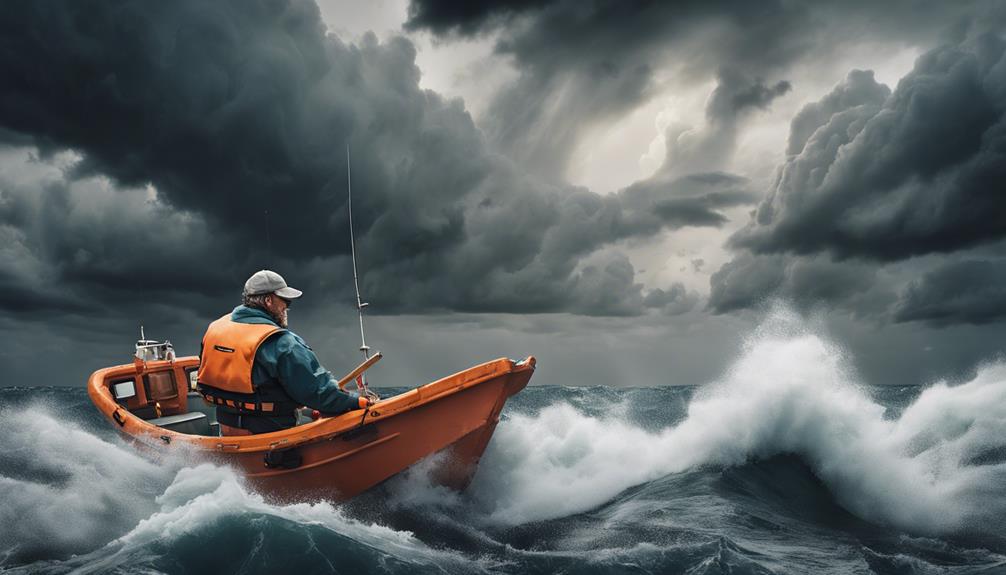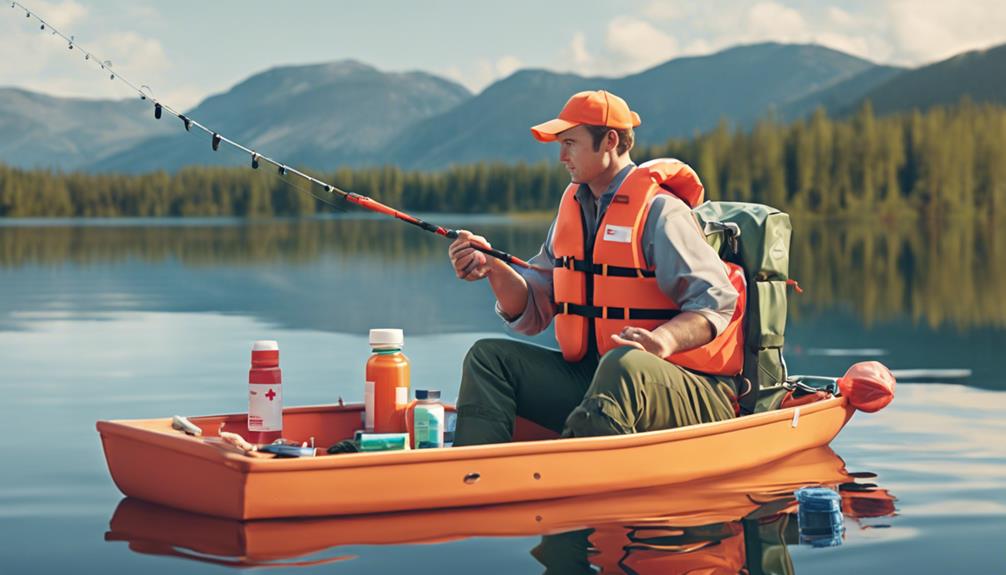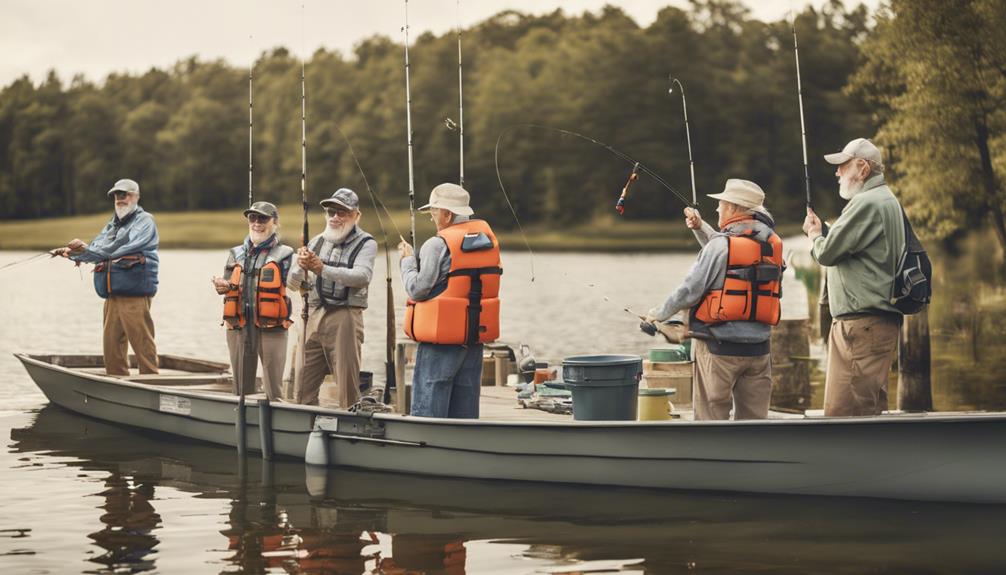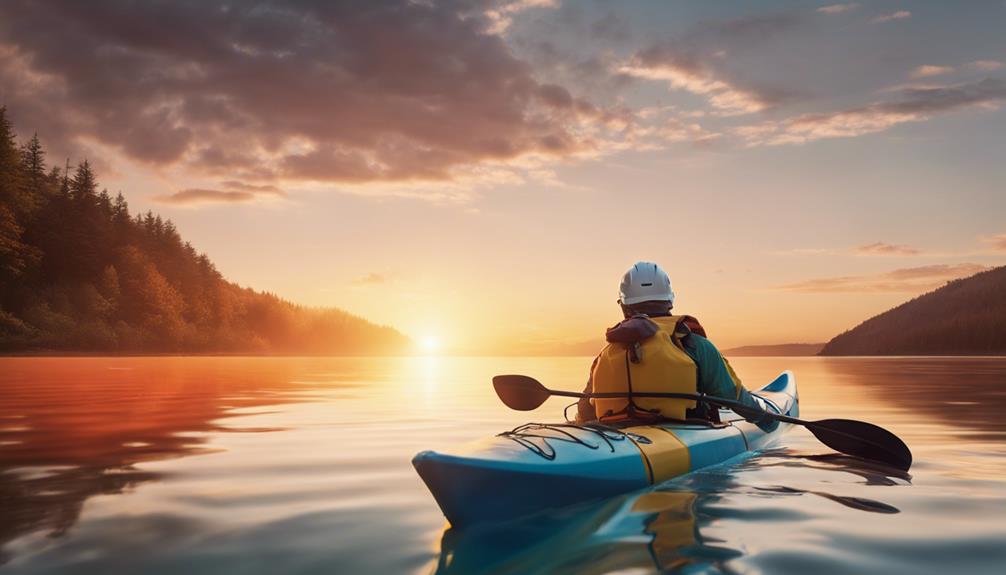You might not be aware that fishing in rough weather can pose significant risks if proper precautions are not taken. Imagine being out on the water, facing strong winds and choppy waves, unsure of how to navigate the situation safely.
What if there were simple yet effective tips that could ensure your fishing trip remains secure even in challenging weather conditions? By following these seven expert suggestions, you can enhance your safety and enjoyment while fishing in rough weather.
Check Weather Forecast
Before heading out to fish in rough weather, make sure to check the weather forecast for any potential dangers or changes. Boat preparation is crucial when facing challenging conditions. Start by inspecting your vessel for any signs of wear and tear. Check that all essential safety equipment is on board and in good working condition. This includes life jackets, flares, a first aid kit, and a VHF radio. Ensure that the bilge pump is functioning properly to handle any excess water that may enter the boat.
Safety precautions should be a top priority when venturing out in rough weather. Make sure all passengers are wearing life jackets at all times. Inform someone on land about your fishing plans and expected return time. It's also wise to have a plan in place in case of an emergency, such as knowing the nearest safe harbor or how to call for help if needed. Keep a close eye on the weather conditions while out on the water and be prepared to head back to shore at the first sign of worsening weather.
Wear Proper Gear
Ensure you're properly equipped with the right gear to enhance your safety and comfort while fishing in rough weather. Proper attire is essential when facing challenging conditions. Opt for waterproof and windproof clothing to shield yourself from the elements. A sturdy pair of waterproof boots will keep your feet dry and provide traction on slippery surfaces. Dressing in layers allows you to adjust to changing temperatures, ensuring you stay warm throughout your fishing expedition.
In addition to proper attire, regular gear maintenance is crucial for your safety. Check your equipment before heading out to ensure everything is in working order. Inspect your fishing rod, reel, and lines for any signs of wear or damage. Replace any worn-out components to prevent malfunctions while you're out on the water. Keeping your gear well-maintained not only enhances your fishing experience but also reduces the risk of accidents or equipment failures.
Have a Safety Plan
When fishing in rough weather, it's crucial to have a safety plan in place to ensure your well-being and preparedness for any unexpected challenges that may arise. Developing communication channels is essential for a successful safety plan. Make sure everyone in your fishing group knows how to reach each other in case of separation or emergency. Establishing a designated meeting point in case you get separated can help streamline the emergency response process.
When creating your safety plan, consider factors like weather alerts and emergency procedures. Stay informed about weather conditions before heading out and have a clear understanding of how to react if the weather suddenly worsens. Additionally, familiarize yourself with basic first aid techniques and ensure you have a well-stocked first aid kit on board.
Practice drills with your fishing companions to simulate emergency scenarios. This preparation can help you react swiftly and effectively in case of a real emergency. Discuss roles and responsibilities so everyone knows what to do in different situations.
Incorporating these elements into your safety plan can significantly enhance your ability to handle unexpected challenges while fishing in rough weather. Remember, being proactive and prepared is key to ensuring a safe and enjoyable fishing experience.
Inform Someone of Plans
To enhance your safety while fishing in rough weather, make sure to inform someone of your plans before heading out on the water. This simple step can be crucial in ensuring that help can reach you promptly if needed.
Here are some key points to consider when informing someone of your fishing plans:
- Emergency Contacts: Provide the person you inform with relevant emergency contacts, such as the coast guard, local authorities, or nearby marinas. In case of an emergency, having these contacts readily available can expedite the response time and increase your chances of a successful rescue.
- Communication Strategies: Discuss communication strategies with the person you inform. This could include setting up regular check-in times via phone or radio, establishing specific signals for different situations, or outlining a plan for what actions should be taken if you fail to check-in as scheduled.
- Expected Return Time: Clearly communicate the time you expect to return from your fishing trip. This information can be vital if you encounter difficulties on the water, as it gives rescuers a starting point for their search efforts.
- Location Details: Provide details about your intended fishing location, including coordinates if possible. This information can help rescuers locate you more quickly in case you drift off course or encounter problems.
Use Proper Anchoring Techniques
Secure your vessel effectively by employing proper anchoring techniques in rough weather conditions. Anchor stability is crucial when facing challenging weather out at sea. To ensure your anchor holds firm, choose an anchor that's appropriate for the size and weight of your vessel. A heavy-duty anchor with good holding power is essential in rough weather to prevent your boat from drifting or being carried away by strong winds and currents.
Weather precautions must also be taken into consideration when anchoring in rough conditions. Before dropping anchor, check the weather forecast to anticipate any upcoming changes in wind speed or direction. It's advisable to anchor with additional scope, meaning to let out more anchor rode than you'd in calm conditions. This extra length provides greater holding power and helps to absorb the impact of sudden gusts or waves.
When anchoring in rough weather, always double-check that your anchor is securely set by applying steady reverse pressure to ensure it has dug into the seabed properly. Stay vigilant and be prepared to re-anchor if needed. By following these anchoring techniques and weather precautions, you can increase the stability of your vessel and enhance safety while fishing in rough weather.
Stay Alert to Changing Conditions
Stay vigilant for any shifts in weather conditions while fishing in rough weather to ensure the safety and stability of your vessel. Being aware of changing conditions is crucial for your well-being and the security of your fishing expedition. Here are some key points to consider:
- Safety Precautions: Always wear a life jacket, even if the weather seems calm at the start. Conditions can change rapidly, and it's better to be prepared. Additionally, have a first aid kit on board in case of any emergencies.
- Weather Awareness: Keep a close eye on the sky for darkening clouds, sudden wind shifts, or a rapid drop in temperature. These can be signs of an approaching storm or other hazardous weather conditions. Listen to weather forecasts before heading out and be prepared to head back if conditions worsen.
- Monitor Sea Conditions: Watch for changes in the sea state, such as increasing wave height, whitecaps, or a sudden swell. These can indicate rougher conditions ahead, which may impact your ability to safely navigate or anchor.
- Stay Connected: Bring a reliable means of communication, such as a marine radio or a fully charged cell phone in a waterproof case. In case of emergencies, being able to reach out for help can make a significant difference in ensuring your safety and the safety of others on board.
Know Emergency Procedures
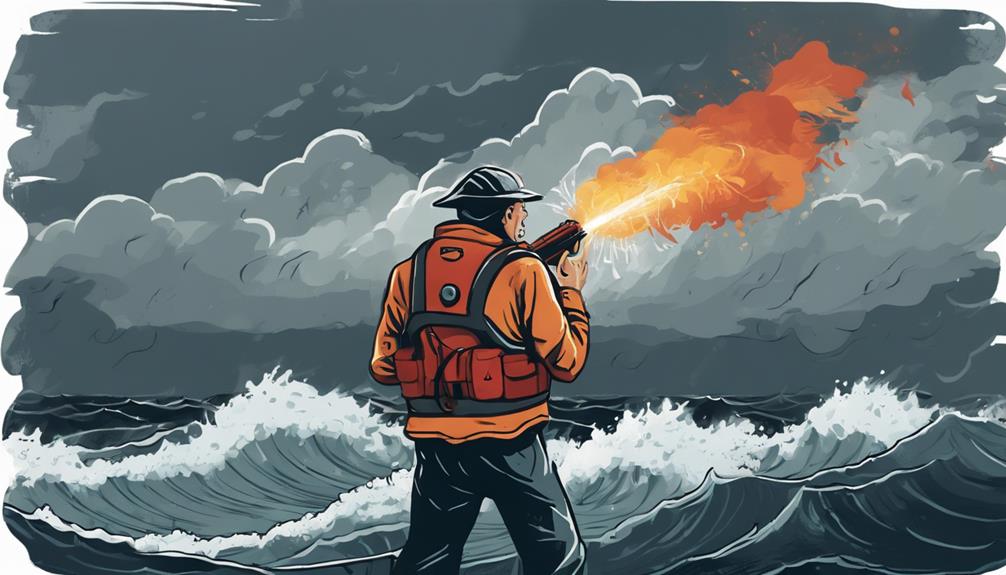
In case of an emergency while fishing in rough weather, familiarize yourself with the necessary procedures to handle unexpected situations effectively. It's crucial to be prepared for any potential dangers that may arise when you're out on the water. One essential step is to practice drills beforehand so that you know exactly what to do in case of an emergency. By rehearsing these procedures, such as how to respond to a man overboard situation or how to use emergency signaling devices, you can react swiftly and confidently if a crisis occurs.
Additionally, make sure to have a list of emergency contacts readily available. This list should include numbers for the Coast Guard, local marine rescue services, and anyone else who could assist you in an emergency situation. Having these contacts easily accessible can save precious time during a crisis.
Seek Shelter if Necessary
If rough weather conditions worsen while fishing, consider finding a safe shelter to protect yourself and your equipment. Safety should always be a top priority when facing challenging weather conditions. Here are some key points to keep in mind:
- Emergency shelters: In case of sudden storms or worsening weather, knowing the locations of emergency shelters near your fishing spot can be lifesaving. These shelters are designed to provide temporary refuge and protection from the elements until help arrives.
- Safety precautions: Before heading out to fish, familiarize yourself with the potential shelter options in the area. It's essential to have a plan in mind in case you need to seek shelter quickly. Additionally, ensure that your shelter choice is sturdy and can withstand strong winds and heavy rain.
- Stay informed: Keep an eye on weather forecasts and updates while fishing. If there are any warnings or alerts issued for your area, it's crucial to act swiftly and seek shelter immediately. Don't take risks by trying to tough it out in dangerous weather conditions.
- Equipment protection: Seeking shelter not only keeps you safe but also helps protect your fishing gear from damage. Exposure to harsh weather elements can cause significant harm to your equipment, so finding a secure shelter can prevent unnecessary loss or damage.
Frequently Asked Questions
How Can I Prevent Sea Sickness While Fishing in Rough Weather?
To prevent seasickness while fishing in rough weather, there are several strategies you can try. Natural remedies like ginger or medication prescribed by a doctor can be effective. Breathing techniques and acupressure can also help alleviate symptoms. Stay hydrated and avoid heavy meals before heading out. Keep your eyes on the horizon to help with balance. Remember, preparation and self-care are key to enjoying your fishing trip without feeling queasy.
Preparing in advance and taking care of yourself will ensure a more enjoyable experience on the water.
What Should I Do if I Encounter a Sudden Storm While Out on the Water?
If you encounter a sudden storm while out on the water, seek shelter immediately. Emergency shelters are crucial for your safety.
Follow safety protocols by securing yourself and any equipment. Stay calm and wait for the storm to pass before continuing fishing.
Are There Any Specific Communication Devices or Tools I Should Bring With Me for Added Safety?
When you're out on the water, it's essential to have emergency communication devices and safety tools for added security. Make sure to bring a reliable marine radio or a satellite phone to call for help in case of an emergency.
Additionally, having tools like a first aid kit, a whistle, and a flashlight can be crucial for staying safe while fishing. Prioritize safety by being prepared with these essential items.
How Can I Properly Secure My Fishing Equipment to Prevent Damage in Rough Weather?
To properly secure your fishing equipment in rough weather, tie down all gear to prevent damage. Use strong straps or bungee cords to secure rods, tackle boxes, and coolers.
Double-check all connections for tightness before heading out. Safety precautions like this can help ensure your equipment stays safe and secure, even in challenging conditions.
Take the time to secure everything well before you start fishing to avoid any mishaps.
What Are Some Common Mistakes to Avoid When Fishing in Rough Weather Conditions?
When fishing in rough weather, safety measures are crucial. Avoid common mistakes like not wearing a life jacket, underestimating the power of the water, or neglecting proper gear.
Stay alert, secure your equipment, and be prepared for changing conditions. Always check the weather forecast before heading out and prioritize your safety above all else.
Conclusion
So next time you head out for a fishing trip in rough weather, remember to:
- Check the forecast.
- Wear the right gear.
- Have a safety plan.
- Inform someone of your plans.
- Use proper anchoring techniques.
- Stay alert to changing conditions.
- Know emergency procedures.
- Seek shelter if necessary.
By following these tips, you can ensure a secure and enjoyable fishing experience even in challenging weather conditions.
Stay safe out there!
